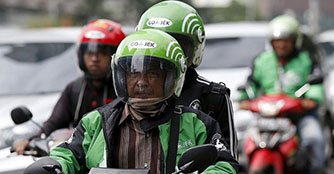South East Asian rivals Go-Jek and Grab to face off in Singapore as Uber exits
02 Apr 2018|4,469 views
The battle for a slice of South East Asia's ride-hailing market is set to heat up, as two billion-dollar homegrown players brace themselves for expansion following the exit of Uber.

The ride-hailing and logistics services firm aims to set up shop in all four countries this year, as part of plans to grow its presence in the region, a source with knowledge of the plans told The Straits Times.
The planned entry, if it happens, will benefit commuters who feared Grab's takeover would raise prices. It could also affect the ongoing study by Singapore's competition watchdog on the acquisition.
The Competition Commission of Singapore had proposed interim measures to preserve competition, which might be moot with the entry of a sizeable player.
Go-Jek, which began by offering rides on motorcycle taxis - known in Indonesia as ojek - in 2011, will offer its Go-Car service in Singapore, the source added.
Founded by Singapore-born Indonesian Nadiem Makarim, Go-Jek expanded into food delivery, house cleaning and massage services, and began car rides in 2016. It is valued at around US$5 billion ($6.6 billion) today.
Grab, founded by Malaysians Anthony Tan and Tan Hooi Ling, is valued at around US$6 billion ($7.9 billion). Go-Jek and Grab will not be without competitors.
Last week, Singapore carpooling platform Ryde also announced plans to fill the void left by Uber, through offering its RydeX private-hire service in Singapore.
Go-Jek, which has 900,000 partner drivers across Indonesia, has had a data science office in Singapore's Central Business District since January last year.
Singapore University of Social Sciences (SUSS) transport economist Walter Theseira noted Go-Jek has a proven track record of being able to compete against Grab in Indonesia, and having services in Singapore would be a good 'branding exercise' to prove it can succeed elsewhere.
Grab already offers food delivery and mobile payments in Singapore. Urban transport expert Park Byung Joon, an associate professor at SUSS' School of Business, said Go-Jek could introduce these services.
But the success of these rivals is likely to depend on how much cash they are willing to invest in incentives for both drivers and commuters. As Prof. Park said, "It's all about how deep their pockets are."
The battle for a slice of South East Asia's ride-hailing market is set to heat up, as two billion-dollar homegrown players brace themselves for expansion following the exit of Uber.

Indonesian ride-hailing and online payment giant Go-Jek started out by offering rides on motorcycle taxis
The ride-hailing and logistics services firm aims to set up shop in all four countries this year, as part of plans to grow its presence in the region, a source with knowledge of the plans told The Straits Times.
The planned entry, if it happens, will benefit commuters who feared Grab's takeover would raise prices. It could also affect the ongoing study by Singapore's competition watchdog on the acquisition.
The Competition Commission of Singapore had proposed interim measures to preserve competition, which might be moot with the entry of a sizeable player.
Go-Jek, which began by offering rides on motorcycle taxis - known in Indonesia as ojek - in 2011, will offer its Go-Car service in Singapore, the source added.
Founded by Singapore-born Indonesian Nadiem Makarim, Go-Jek expanded into food delivery, house cleaning and massage services, and began car rides in 2016. It is valued at around US$5 billion ($6.6 billion) today.
Grab, founded by Malaysians Anthony Tan and Tan Hooi Ling, is valued at around US$6 billion ($7.9 billion). Go-Jek and Grab will not be without competitors.
Last week, Singapore carpooling platform Ryde also announced plans to fill the void left by Uber, through offering its RydeX private-hire service in Singapore.
Go-Jek, which has 900,000 partner drivers across Indonesia, has had a data science office in Singapore's Central Business District since January last year.
Singapore University of Social Sciences (SUSS) transport economist Walter Theseira noted Go-Jek has a proven track record of being able to compete against Grab in Indonesia, and having services in Singapore would be a good 'branding exercise' to prove it can succeed elsewhere.
Grab already offers food delivery and mobile payments in Singapore. Urban transport expert Park Byung Joon, an associate professor at SUSS' School of Business, said Go-Jek could introduce these services.
But the success of these rivals is likely to depend on how much cash they are willing to invest in incentives for both drivers and commuters. As Prof. Park said, "It's all about how deep their pockets are."
Latest COE Prices
December 2025 | 1st BIDDING
NEXT TENDER: 17 Dec 2025
CAT A$105,413
CAT B$123,900
CAT C$76,501
CAT E$123,000
View Full Results Thank You For Your Subscription.




















